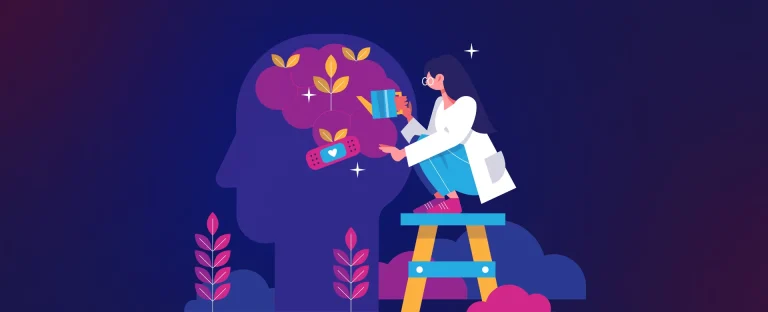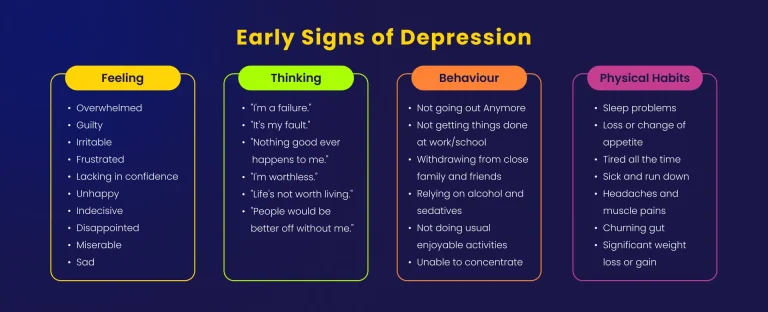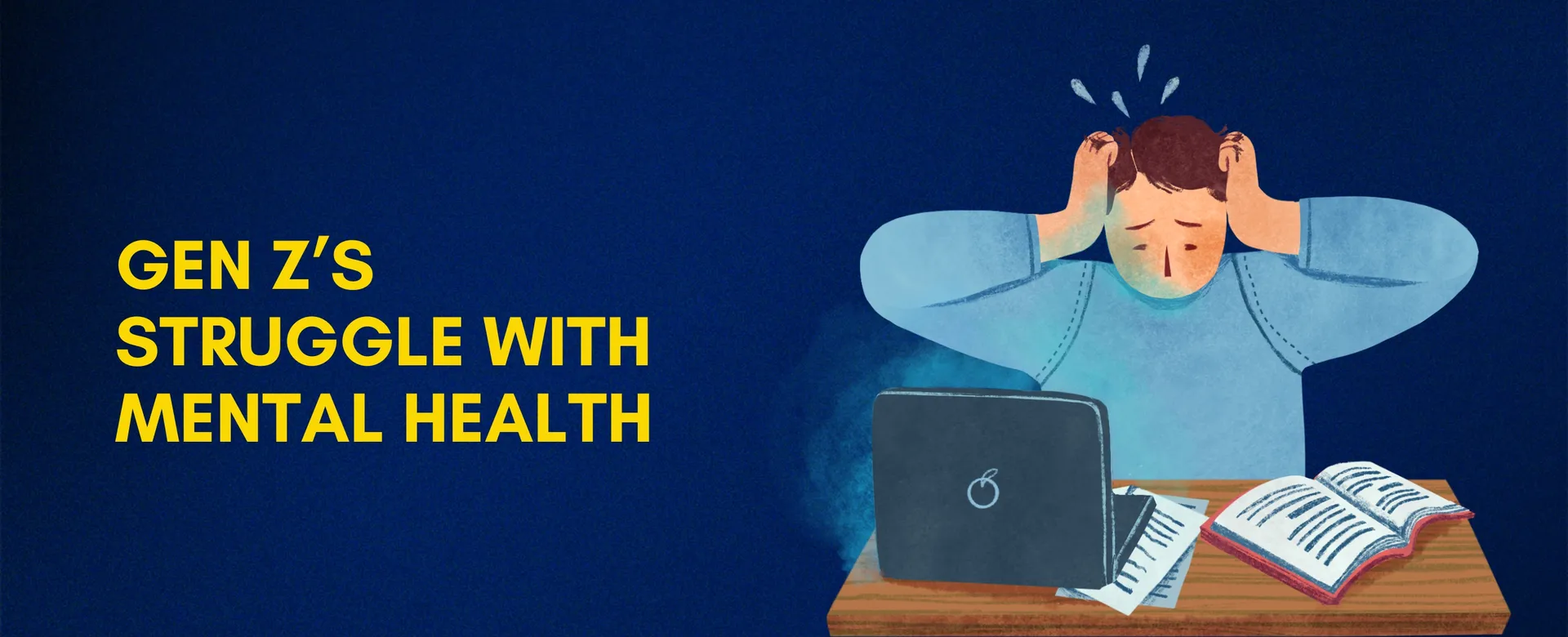What is the first thing that comes to mind when you hear the word, ‘mental health’?
Is it anxiety, stress, overthinking, breakdown, depression?
This is the most common understanding of mental health; however, it is much more!
World Health Organization (WHO) defines mental health as, “a state of well-being in which the individual realizes his or her abilities, can cope with the normal stresses of life, can work productively and fruitfully, and can contribute to his or her community.”
Mental health is no different from physical health.
👉 Why is mental health important for students ?
👉 Top-Rated Courses for 2025 📚 – https://inspiria.edu.in/degree-courses/
A physically fit body can perform all functions to satisfaction; similarly, a healthy mind brings about thriving and flourishing. What defines a healthy mind is cognitive and emotional well-being. Mental disorders surface when we ignore mental health.
We must also keep in mind that we live in a time of excessive exposure to information, lifestyle is sedentary and there’s little or no connection with the natural world. This naturally impacts our physical and mental health.
The quality of mental health exists on a continuum. Like on a life ladder, we move up and down according to circumstances, experiences, and situations.
How this movement affects our state of being depends on our resilience skills, emotional intelligence, state of presence or mindfulness and patience. This in turn is determined by our upbringing, genetics and governing set of values.
At one end of the continuum is positivity like contentment, satisfaction and fulfilment and on the other are mental disorders like depression, anger and anxiety. The external experiences and our inner strength determine the frequency of the movement on the continuum and its impact on our overall well-being.
What is important to note is that circumstances are unpredictable and so is our power of resilience. Sometimes we bounce back easily, other times, it is a slow process and one may need support to recover.
The good news is that the movement on the spectrum is in either direction, which means there’s a possibility of returning to a healthy, thriving mental state of being after hitting rock bottom and feeling hopeless.
One can even retain a state of balance (middle path) by strengthening the inner qualities of resilience, willpower and acceptance.

The Mental Health Continuum Model illustrates the different mental health phases in four colours.
- Healthy and adaptive coping (green)
- Mild and reversible distress (yellow)
- More severe and persistent functioning impairment (orange)
- Clinical illnesses and disorders requiring concentrated medical care (red)
| Healthy | Reacting | Injured | Ill |
| Normal fluctuations in mood, calm, takes things in stride Normal sleep patterns, few sleep difficulties Physically well, good energy levelConsistent performance Sense of humor, in control mentally Physically active and socially active Limited or no gambling/alcohol use | Nervousness, irritability, impatience, sadness, feeling overwhelmed Trouble sleeping, intrusive thoughts, nightmares. Tired/low energy, muscle tension, headaches Procrastination Displaced sarcasm, forgetfulness Decreased physical and social activity Regular but controlled gambling/alcohol use | Anxiety, anger, pervasive sadness, hopelessness Restless or disturbed sleep, recurring images or nightmares Increased fatigue, aches and pains Poor performance and concentration or workaholic, presenteeism Negative attitude Social avoidance or withdrawal Increased gambling/alcohol use | Excessive anxiety, easily angered, depressed mood, suicidal thoughts Unable to fall or stay asleep, sleeping too much or too little Exhaustion, physical illness Unable to perform duties/control behavior/concentrate, overt subordination, absenteeism Isolation, avoiding social events, not going out or answering the phone Alcohol/gambling addiction, other addictions |
| Actions to take at each phase of the continuum | |||
| Focus on task at hand Break problems into manageable chunks Identify and nurture support systems Maintain healthy lifestyle | Recognize limits Identify and minimize stressors Engage in healthy coping strategies Get adequate food, rest, and exercise | Identify and understand own signs of distress Seek social support and talk with someone instead of withdrawing Seek help | Seek consultation as needed Follow health care provider recommendations Regain physical and mental health |
College Life and Mental Health
Transition to college brings significant life changes. This is a stage where students are in the process of finding their self-worth and worth in society.
This period while offering new opportunities for growth, exploration, freedom and friendship can also be overwhelming, leading to a range of mental health issues that affect students’ academic performance, relationships, and overall quality of life.
Research indicates that mental health challenges such as anxiety, depression and stress-related disorders scale up at this stage and are the main cause of college dropouts, low self-esteem and long-term emotional difficulties.
Recognizing signs of mental distress and addressing them early is crucial for ensuring students thrive both academically and personally.
Mental health in college encompasses emotional, psychological and social well-being. A sound balance of all three brings about involvement and success.
Institutions need to focus on these areas and provide timely support, the key ingredient being care.
Colleges must have a range of resources such as trained professionals, counselling centers, workshops, peer support programs and student organizations for help to bounce back on the continuum. Open platforms that encourage discussion on topics related to importance of mental health will help wipe out the stigma around mental health.
Understanding the Challenges
1. Academic Pressure: The demands of coursework, exams, and maintaining a good GPA/grade can create significant stress. Many students feel the need to excel, which can lead to burnout.
2. Social Adjustments: Meeting new people and forming friendships can be daunting. The fear of loneliness or not fitting in may contribute to feelings of anxiety.
3. Life Changes: Moving away from home, managing finances, and balancing independence can be overwhelming for many students.
4. Mental Health Stigma: Despite increased awareness, stigma around mental health persists. This can make it difficult for students to seek help.
Early detectors of mental health disorders are as follows.
- Erratic sleep patterns – This means sleeping and waking up at odd hours which in turn affects our mood and physical body
- Disrupted eating habits – This could be not paying attention to what one’s eating, not eating promptly and eating in any proportion.
- No sense of hygiene – Avoiding taking a shower regularly, untidy rooms, dark lighting, dirty clothes.
- Procrastination– Making an excuse to complete tasks on time.
- Constant emotional bouts and mood swings- Mood keeps changing for no particular reason.
- Loneliness– Feeling left out /avoiding company.
- Loss of interest– Not being able to enjoy activities that once were fun.
- Lack of purpose – A sense of being lost.
- Distracted – Too confused and clueless.
- Feeling overwhelmed – Lack of planning and organization.
Physical health disorders are as follows.
- Headache
- Stomach ache
- Body ache
- Skin rashes
- Weak immune system
- Weak digestion
- Fatigue
- Weight loss

Ways to address the problem
Seeking help for mental health concerns is an important step toward improving well-being and finding support. Here are several ways to access help.
- Seek help: Develop the courage to share your problems with a counsellor, teacher and family member. Don’t hold yourself back from seeking help.
- Participate in extracurricular activities: Engage in activities like sports, exercise, dancing, yoga, singing, community service, gardening, or anything that helps to keep the mind engaged and the body active.
- Practice self-care: Pay attention to your eating habits. Make it a point to eat healthy food on a timely basis. Avoid snacking to kill boredom. Maintain a healthy sleeping habit where you follow regularity and your body gets between seven to eight hours of rest. and The third area to focus on is hygiene. Keep your room tidy, shower regularly, laundry your clothes and allow for natural light to come into the room. Make a conscious effort to follow a healthy routine pattern and appreciate your effort.
- Develop Time management skills: Make a planner and paste it on your wall where it is visible. Use apps and reminders on your digital devices to help with time management.
- Set realistic goals: Choose subjects and activities based on your skill and interest. Break tasks into manageable steps so you achieve them without feeling overwhelmed.
- Utilize campus resources: Use college facilities such as the sports field, gym, library, club events, guest lectures, and skill development programs to boost one’s confidence and abilities.
- Seek Professional Help: Most colleges offer counselling services. If and when you need such support, reach out without hesitation.
- Journal: Keeping a journal or a notebook where you can sketch and write your feelings is a therapy. This is a useful tool for those who are an introvert by nature.
- Spend time outdoors: Step out of your room and go for a walk or a run.
- Connect with nature: Take nature walks, go camping, hiking or biking. Nature has a natural rhythm and spending time in nature will help slow down and get the much-needed pause.
Conclusion.
Prioritizing mental health in college is essential for fostering a flourishing and vibrant college environment. As students navigate the challenges of academic pressures, personal growth, and social dynamics, a supportive environment is essential. By cultivating a culture of compassion and care, students are at ease to face their struggles and build resilience. Investing in mental health is an investment in the successful well-being of the students and society as a whole.








